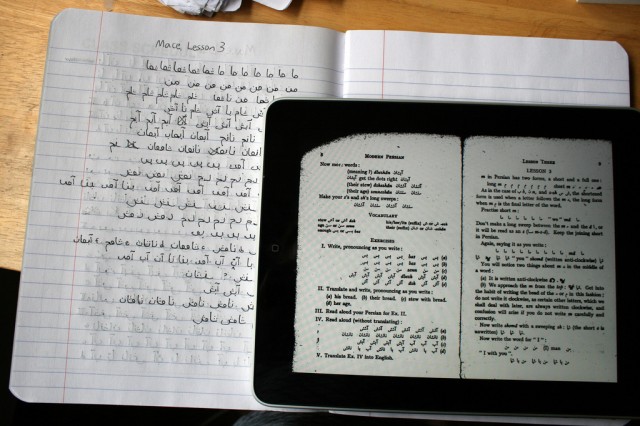
In a newly approved patent, an economics professor hopes to bring to the academic publishing world what seems to be forthcoming in the video game industry—new restrictions that would seemingly eliminate a secondary market for digital goods and prevent legal borrowing.
Last week, the 2006 patent for a “Web-based system and method to capture and distribute royalties for access to copyrighted academic texts by preventing unauthorized access to discussion boards associated with copyrighted academic works” was approved by the United States Patent and Trademark Office. The patent was granted to Joseph Henry Vogel, a professor at the University of Puerto Rico-Río Piedras.
The system, according to the filing, is designed to prevent cases where “unauthorized access to copyrighted academic texts is provided in which trademark licenses, discussion boards, and grade content are integrated into a Web-based system.”
Vogel’s patent filing says the system is designed to provide an anti-piracy measure. Students would be required to purchase a unique digital code that would unlock access to online course material.
“The system implements a process by which any enrolled student who has not purchased the textbook will be denied access to a discussion board of an official site (‘Site’) of the system controlled by the patent holder,” the filing states. “Thus, a student who does not legally purchase the text will be unable to participate in the discussion board and therefore will forfeit that portion of the grade associated with it. It is likely that most students do not want to forfeit that portion of their grade and therefore will legally purchase the text.”
Legal questions remain
If implemented, Vogel’s system would appear to eliminate one of the oldest methods of student collaboration and cooperative learning: text sharing.
“So you might see students who share their textbooks might be on the hook for patent infringement and copyright infringement?” said Julie Samuels, a staff attorney at the Electronic Frontier Foundation. “That’s not good news.”
Not surprisingly, legal scholars are highly skeptical that this patent violates the spirit, if not the letter, of the existing balance in copyright law. Current law provides exceptions to the copying of copyrighted material, including fair use and the first-sale doctrine, legally allowing books to be resold a second time. In addition, it would effectively prevent libraries from holding copyrighted works for student use.
“What’s troubling is that as a society we should incentivize student learning and this patent does the opposite—that’s troubling,” Samuels added.
Beyond the legal questions, other experts suggested that forcing students to buy texts through such a system is unlikely to be implemented. Professors have few incentives to make it more difficult and to compel students even more than they already are to buy textbooks, digital or analog. (A 2011 survey from UC Riverside found that 78 percent of undergraduates "bought fewer books, bought cheaper books, or read books on reserve to help meet expenses.")
“I’m not all that worried that this is going to do much because this is aged thinking as to how students would access materials for courses,” said Dave Hansen, the Digital Library Fellow at Berkeley Law. “I can’t envision too many responsible instructors going along with it.”
In another e-mail sent to Ars, Gary Beckner, the executive director of the Association of American Educators, suggested that while the use of digital tools was on the rise in American education, “it’s imperative that students have easy access to meaningful information and resources. While copyright laws should be respected, we shouldn't be putting unnecessary barriers on critical information for students.”
Not surprisingly, Rick Falkvinge, the founder of the Pirate Party, says he's also against such a system.
"The notion that academics go to lengths to prevent the spread of knowledge comes close to sacrilegious," he wrote in an e-mail to Ars. "In particular, it is a complete conflict of interest between the profits of old-guard publishers and the real mission of academia—to spread knowledge as widely as possible."
Professor says his system put significant dent in piracy
Vogel, in an e-mail sent to Ars, argued that his system will “make very significant inroads” in combating digital textbook piracy.
“The system is to align incentives of all parties while enhancing efficiency and equity—twin goals of economic thinking,” he added. “Yes, if someone is accessing a product or service that incurred costs in its production, they should pay.”
Additionally, he posited that professors would be on board with such as system as they would have “quick access to textbooks from the first day of class.” This system would also allow staff to “have a discussion board where the student cannot opt-out of participating,” and ultimately, “professors will know that their relinquishment of some academic freedom (in determining the composition of the final grade) is being offset by financing initiatives that promote academic freedom.”
Listing image by Quinn Anaya
reader comments
97